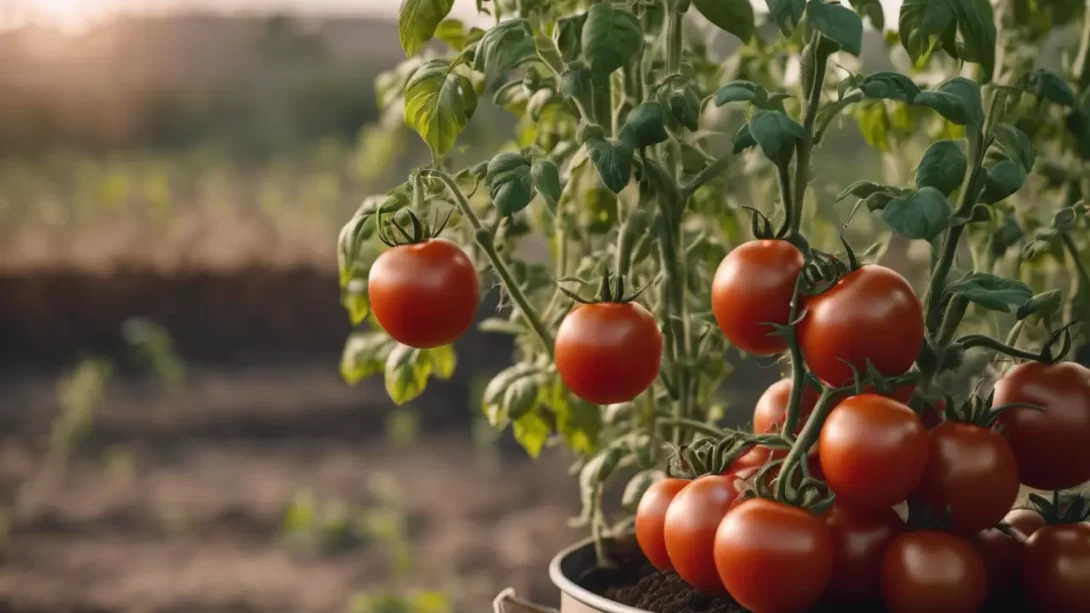Growing tomatoes in a 5-gallon bucket is an excellent solution for gardeners with limited space or those looking for a portable gardening option. This method is ideal for patios, balconies, or small gardens. Utilizing 5-gallon buckets for growing tomatoes offers benefits like better control over soil quality, reduced weed problems, and ease of moving plants to optimize sunlight exposure. This article will guide you through the steps for successfully planting and caring for tomatoes in a 5-gallon bucket.
Choosing the Right Tomato Variety
Selecting the appropriate tomato variety is crucial for container gardening success. Determinate or bush varieties are preferred for their more compact growth habit, making them well-suited for the confined space of a bucket. Varieties like ‘Roma’, ‘Bush Early Girl’, and ‘Patio Princess’ are excellent choices. These varieties typically require less staking and pruning than indeterminate varieties and are known for their plentiful yields in smaller spaces.
Materials and Tools Required
To get started, gather the following materials: a 5-gallon bucket, high-quality potting mix, a young tomato plant or seeds, a drill for making drainage holes, sufficient water, and optional support structures like stakes or cages. Each of these materials plays a role in ensuring the health and productivity of your tomato plant. The choice of a 5-gallon bucket is particularly important, as it provides enough space for root development and soil moisture retention.
Preparing the 5-Gallon Bucket
Begin by preparing your 5-gallon bucket. Drill several drainage holes in the bottom to prevent waterlogging and promote healthy root growth. If desired, add a layer of gravel or broken pottery pieces to further improve drainage. This is especially important if the bucket will be placed in an area where water drainage could be a concern, such as on a balcony or indoor space. In such cases, placing a saucer or tray under the bucket to catch excess water is advisable.
Soil and Fertilization
The right soil mix is essential for growing tomatoes in a bucket. Choose a high-quality potting mix that is lightweight and provides good drainage while retaining enough moisture to keep roots hydrated. Avoid using garden soil as it can be too heavy and may contain pests and diseases. For optimal growth, the soil should also allow for adequate root aeration.
Fertilization is key to the health and productivity of your tomato plants. Start with a balanced, slow-release fertilizer mixed into the potting soil. As the plant grows, use a tomato-specific fertilizer, rich in phosphorus and potassium, to encourage healthy fruit development. Follow the manufacturer’s guidelines for the frequency and amount of fertilizer application.
Planting the Tomato Plant
Now, let’s plant your tomato:
- Planting Seeds or Young Plants: If starting from seeds, sow them according to packet instructions. For young plants, make a hole in the center of the potting mix, deep enough to accommodate the root ball. Gently place the plant in the hole and fill around it with soil, firming it down lightly.
- Depth and Spacing: Plant tomatoes deep, burying up to two-thirds of the stem. This encourages the formation of additional roots for a stronger plant. In a 5-gallon bucket, plant only one tomato to prevent overcrowding.
- Initial Watering: Water the plant thoroughly after planting. This initial watering helps settle the soil around the roots and eliminates air pockets.
Location and Sunlight
Choosing the right location for your tomato bucket is crucial. Tomatoes require at least 6 to 8 hours of direct sunlight daily for optimal growth and fruit production. Place the bucket in a spot that receives ample sunlight throughout the day. If necessary, move the bucket periodically to ensure consistent light exposure, which is one of the advantages of container gardening.
Watering and Maintenance
Watering correctly is essential for container-grown tomatoes:
- Watering Schedule: Water your tomato plant when the top inch of soil feels dry. Ensure thorough watering so that moisture reaches the deep roots. Avoid overwatering, as it can lead to root rot and other issues.
- Monitoring Soil Moisture: Check soil moisture regularly, as container plants can dry out quickly, especially in hot weather. However, be cautious of waterlogging, particularly after heavy rains.
Supporting the Tomato Plant
As your tomato plant grows, providing adequate support is crucial to prevent stem breakage and promote healthy growth. Here’s how to do it:
- Using Stakes or Cages: Insert a stake or a tomato cage into the bucket at the time of planting. This helps avoid root disturbance later on. Ensure the support is sturdy enough to bear the weight of the plant as it grows and fruits.
- Tying Up the Plant: Gently tie the tomato plant to the stake or cage with soft garden ties or strips of cloth. Leave some slack for the stem to grow and avoid tying it too tightly.
- Regular Adjustments: As the plant grows, continue to adjust and add ties where necessary to support new growth and keep the plant upright.
Harvesting and Ongoing Care
- Knowing When to Harvest: Tomatoes are ready to harvest when they reach their full color and are slightly soft to the touch. Gently twist the fruit to remove it from the stem.
- Continuous Care: Continue to water and fertilize the plant regularly. Remove any yellow or diseased leaves to maintain plant health and air circulation.
- End-of-Season Care: At the end of the growing season, you can compost the plant and soil. Clean and store the bucket for next year’s planting.
Transitioning for Indoor Growth
- Optional Indoor Growing: If you live in a region with a short growing season, consider moving your tomato plant indoors as temperatures drop. Place it in a sunny window and reduce watering.
Conclusion
Growing tomatoes in a 5-gallon bucket is a rewarding and efficient way to enjoy homegrown tomatoes, even in limited spaces. By carefully selecting the right variety, preparing the bucket, and providing consistent care, you can cultivate a healthy and productive tomato plant. This approach offers the flexibility to optimize growing conditions and enjoy the fruits of your labor. So, get your buckets ready and embark on the fulfilling journey of bucket gardening!



